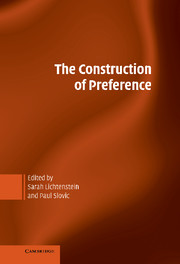Crossref Citations
This Book has been
cited by the following publications. This list is generated based on data provided by Crossref.
Huang, Peter H.
2006.
Emotional Impact Analysis in Financial Regulation: Going Beyond Cost-Benefit Analysis.
SSRN Electronic Journal,
Wilson, Charlie
and
Dowlatabadi, Hadi
2007.
Models of Decision Making and Residential Energy Use.
Annual Review of Environment and Resources,
Vol. 32,
Issue. 1,
p.
169.
Svenson, Ola
Salo, Ilkka
and
van de Loo, Kirsten
2007.
Memories of real-life decisions.
Memory,
Vol. 15,
Issue. 2,
p.
205.
Bateman, Ian
Dent, Sam
Peters, Ellen
Slovic, Paul
and
Starmer, Chris
2007.
The affect heuristic and the attractiveness of simple gambles.
Journal of Behavioral Decision Making,
Vol. 20,
Issue. 4,
p.
365.
Holmes-Rovner, Margaret
Nelson, Wendy L.
Pignone, Michael
Elwyn, Glyn
Rovner, David R.
O'Connor, Annette M.
Coulter, Angela
and
Correa-de-Araujo, Rosaly
2007.
Are Patient Decision Aids the Best Way to Improve Clinical Decision Making? Report of the IPDAS Symposium.
Medical Decision Making,
Vol. 27,
Issue. 5,
p.
599.
Lichtenstein, Sarah
Gregory, Robin
and
Irwin, Julie
2007.
What’s bad is easy: Taboo values, affect, and cognition.
Judgment and Decision Making,
Vol. 2,
Issue. 3,
p.
169.
Peters, Ellen
Dieckmann, Nathan
Dixon, Anna
Hibbard, Judith H.
and
Mertz, C. K.
2007.
Less Is More in Presenting Quality Information to Consumers.
Medical Care Research and Review,
Vol. 64,
Issue. 2,
p.
169.
Lipkus, Isaac M.
2007.
Numeric, Verbal, and Visual Formats of Conveying Health Risks: Suggested Best Practices and Future Recommendations.
Medical Decision Making,
Vol. 27,
Issue. 5,
p.
696.
Simon, Dan
Krawczyk, Daniel C.
Bleicher, Airom
and
Holyoak, Keith J.
2008.
The transience of constructed preferences.
Journal of Behavioral Decision Making,
Vol. 21,
Issue. 1,
p.
1.
Peters, Ellen
Slovic, Paul
Västfjäll, Daniel
and
Mertz, C. K.
2008.
Intuitive numbers guide decisions.
Judgment and Decision Making,
Vol. 3,
Issue. 8,
p.
619.
Carlson, Kurt A.
Janiszewski, Chris
Keeney, Ralph L.
Krantz, David H.
Kunreuther, Howard C.
Luce, Mary Frances
Russo, J. Edward
van Osselaer, Stijn M. J.
and
von Winterfeldt, Detlof
2008.
A theoretical framework for goal-based choice and for prescriptive analysis.
Marketing Letters,
Vol. 19,
Issue. 3-4,
p.
241.
Simonson, Itamar
2008.
Will I like a “medium” pillow? Another look at constructed and inherent preferences.
Journal of Consumer Psychology,
Vol. 18,
Issue. 3,
p.
155.
Pfister, Hans-Rüdiger
and
Böhm, Gisela
2008.
The multiplicity of emotions: A framework of emotional functions in decision making.
Judgment and Decision Making,
Vol. 3,
Issue. 1,
p.
5.
Hayden, Benjamin Y.
Heilbronner, Sarah R.
Nair, Amrita C.
and
Platt, Michael L.
2008.
Cognitive influences on risk-seeking by rhesus macaques.
Judgment and Decision Making,
Vol. 3,
Issue. 5,
p.
389.
Lewis, Alan
2008.
The Cambridge Handbook of Psychology and Economic Behaviour.
Antonides, Gerrit
2008.
The Cambridge Handbook of Psychology and Economic Behaviour.
p.
227.
Hsee, Christopher K.
Dubé, Jean-Pierre
and
Zhang, Yan
2008.
The Prominence Effect in Shanghai Apartment Prices.
Journal of Marketing Research,
Vol. 45,
Issue. 2,
p.
133.
Starmer, Chris
2008.
The New Palgrave Dictionary of Economics.
p.
1.
Haybron, Daniel M
2008.
The Pursuit of Unhappiness.
p.
283.
Statnikov, Roman
Anil, Kivanc Ali
Bordetsky, Alex
and
Statnikov, Alexander
2008.
Visualization approaches for the prototype improvement problem.
Journal of Multi-Criteria Decision Analysis,
Vol. 15,
Issue. 1-2,
p.
45.



